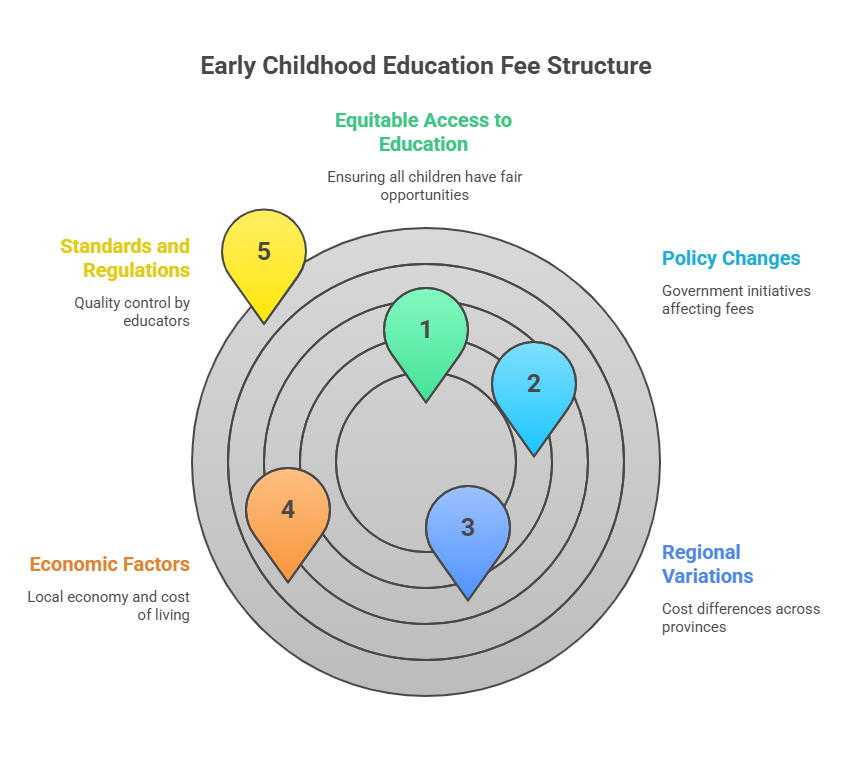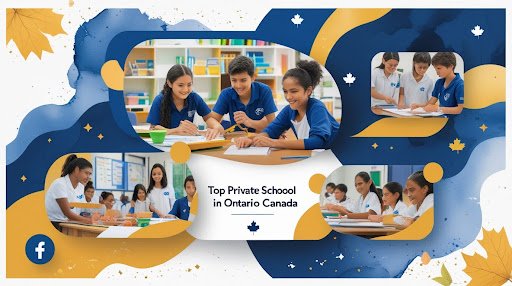Key Highlights of Early Childhood Education Program Fees
- In Canada, early childhood education program fees can go from $2,700 up to more than $18,000 each academic year. The price changes based on the institution and if you are a domestic student or an international student.
- Early childhood education fees, including average preschool cost, affordable preschool programs, public preschool fees, and private preschool fees, depend on the location, type of program like public, private, or Montessori, if you go part-time or full-time, how the staff is managed, and any rules for the program.
- Federal and provincial government help, like the $10-a-day child care plan, brings child care and preschool tuition lower for many families.
- There are real differences in fees between public and private colleges, and also between different provinces and cities.
- You need to think about other costs too. These include books, supplies, criminal background checks, and costs for your placements when you are in an early childhood education diploma program.
- When you compare with the USA, UK, and Australia, early childhood education fees in Canada are often lower for domestic students. This is especially true now, since government support makes the cost of early childhood education programs even more affordable.
Introduction
Early childhood education is important for young children. These education programs help with the holistic development of every child. They focus on making responsive relationships and creating good and meaningful learning opportunities. This gives children a strong start in their early years.
It is important for families to understand the fees of an early childhood education program. This helps people plan their money and find quality care for their kids. The cost of these learning opportunities can change. The price depends on the type of program, where you live, and other things. That is why parents need to stay updated. When people know more about early childhood education program fees and how the costs work, they can make better choices for their children’s future.
Understanding Early Childhood Education Program Fees in Canada
It can be hard to understand early childhood education program fees in Canada. The cost depends on things like the type of program, where it is, and the rules that guide the early years sector. Parents need to think about more than just tuition fees. They should also look at other costs, like ancillary fees, that can add to what they pay for child care settings. By watching and using community resources, families can get the help they need to make good choices. These choices can fit their budget but still help their children step into early learning that builds holistic development.
What Counts as an Early Childhood Education Program?
Early childhood education programs offer many services. These are made to help with the healthy development of young children in a range of early years and healthy early learning environments and early years contexts. These early childhood programs often include childcare centres, child care settings, preschools, and family centres. They focus on responsive relationships and give children meaningful learning opportunities.
These early years programs must follow the ethical standards of the early years sector and the standards of practice set by the College of Early Childhood Educators, including the College of Early Childhood Educators Code of Ethics, and agency policies, and reflect upon their impact on one’s own role in early years care. They have to use a holistic development approach that fits the needs of all children in their care.
A quality early years space puts children’s learning first. The people who work there make sure to blend in the principles of lifelong learning and the right developmental support. These are core parts of their program and help to make the most out of every learning opportunity for young children.
Average Monthly and Annual Costs in 2025
Location | Average Monthly Cost (2025) | Average Annual Cost (2025) |
|---|---|---|
High-cost cities | Over $1,200 | Up to $14,400 |
Rural areas | About $800 | From $9,600 |
These fee changes show why families need to look at community resources and financial aid options. It helps all of us make sure the kids get quality early learning and a place that supports healthy development in child care.
Why Fees Vary Across Canada?
There are many things that affect the price of early childhood education programs across Canada. Where you live is very important. If you live in a city, you often pay more for early childhood education than people living in the country. This is because cities have a higher cost of living. The kind of early childhood education program you choose also matters.
Programs with different staffing numbers or teaching styles can change what you pay. Some child care programs provide more services than others, so their fees go up. Knowing all of this helps families figure out the real costs of early childhood and early learning. This will help you make good choices about your child’s learning opportunities and early childhood education program.
Location and Cost of Living Factors
Many things affect the cost of early childhood education across Canada. One of the main reasons is location. In cities, child care costs are often higher. This is because there are more people who want quality early years services, so demand goes up. It is also more expensive for child care providers to run their centers in a city. For example, the price of rent and paying early childhood educators is higher in these areas. Also, the costs to keep the day care running are more in the city.
On the other hand, places far from the city, like rural areas, might have lower tuition fees for early learning. However, they also can have a hard time finding enough qualified people who can work as early childhood educators. They may not have all the services that you find in a city. Parents in these areas may find it harder to get quality early years learning and care for their children.
Program Type and Staffing Ratios
Different types of early childhood education programs can be found, like Montessori, play-based, or ones with more structure. Each type of program will have its own rules about how many staff need to be there with the children. These rules often come from the standards of practice made by a regulatory body. In early childhood programs that care about the whole child and want to help with all areas of child development, you often see smaller group sizes. This is so the educators and young children can have more responsive relationships.
When there are more staff for each child, kids get more time and help from teachers. This helps to create better early learning environments and gives children more meaningful learning opportunities in the early years. For parents who want good, easy-to-find child care, it’s important to know how these programs work and what group sizes and staff numbers mean for quality early years care.
Provincial and Territorial Fee Breakdown

Understanding how fees work in different provinces and territories is important for families dealing with the cost of early childhood education, and this includes an understanding of the ece cost comparison. Fees can change based on the local economy, the types of child care settings, and money issues that affect what people pay.
In rural areas, there may be higher fees because it is hard to get quality early years programs. Urban places may have lower prices because there is more competition. The way things are set is shaped by what early childhood educators do and the rules they follow, which help make sure child development comes first. These standards of practice and laws aim to support all Canada’s communities.
Highest and Lowest Cost Regions
There can be big changes in early childhood education program fees in Canada, depending on the province or territory. In cities, you often see higher child care costs. This is because there is more need for spots and people pay more to live in these places. But if you look at rural areas, it can be easier to find lower prices for early learning.
British Columbia and Ontario are two places where preschool tuition Canada usually costs more. In places in the Atlantic provinces, you may find that early childhood education fees are much lower. It is important for families to know about these differences if they want to look for a good early learning program that matches what they can pay.
When families take time to see what the costs are in different regions, they can make better choices for their child’s early childhood education. This helps to make sure that every child in the country can have fair chances to go to child care and early years programs—no matter where they live.
Recent Policy Changes Impacting Fees
Recent changes in policy have greatly changed what families pay for early childhood education program fees, including daycare fees. The start of the $10-a-day child care plan is a big step. It helps make child care something that more families can pay for all over Canada. Changes in the money given by government authorities also affect the tuition fees in many child care settings.
At the same time, new rules and standards of practice from the College of Early Childhood Educators help keep the balance between cost and quality. These changes are made to support the healthy development of children. They also help make sure that early childhood education programs are welcoming to all children and can help families with their money needs.
Trends in Early Childhood Education Fees (2015–2025)
People know more now about why good early years programs matter. Because of this, there have been big changes in how fees work for early childhood care in Canada. The country has started using national child care agreements, and this has brought down many fees. This makes early childhood education easier to get for families. But, even though fees are lower, things like inflation and higher pay for early childhood education workers make costs go up and down.
Different funding plans in each province and territory also change these prices. These plans try to keep early childhood learning places safe and healthy. They also help make sure fees don’t get too high for families and that children still get good quality early years education.
Fee Reductions After National Child Care Agreements
Recent national child care agreements have changed the way people pay for early childhood education and access childcare funding. The agreements help make child care easier to get. Because of this, fees have dropped in many places. These agreements focus on better quality early childhood care and fair costs. They help keep the family budget on track and make early learning safer and better for children. They also show that financial support is important for complete child development.
By using community resources and working with service agencies, families can get even more out of these early learning agreements. This approach helps parents find meaningful learning opportunities that fit the needs of their children. Families can look for early childhood programs and learning opportunities that lead to good growth.
Inflation and Wage Impacts on Pricing
Rising inflation makes early childhood education program fees go up and puts more pressure on family budgets all over the country. When costs go up for child care settings, staff want higher salaries, and it’s hard for places to keep good educators without doing so. This means that people who run education programs, like early childhood or early learning programs, have to raise their prices, too, so they can pay the new wages.
In the early years sector, there is a lot of competition, and these programs need to be affordable but also need pay well enough to get and keep good teachers. It is important for children to be in a place where they get quality care and this supports their well-rounded development.
Choosing the Right Program for Your Budget
Thinking about your budget is important when you pick an early childhood education program. You want to find a good match between what it costs and the quality. The right choice can give your young children meaningful learning opportunities.
Make sure the education program uses the principles of lifelong learning and helps with holistic development, including perspectives of indigenous peoples and linguistic diversity. Be sure to ask about the skills and training of the early childhood educators regarding how they use observation strategies and also find out about the pedagogical approaches they use too.
Ask about any extra costs or ancillary fees. See what support the program gives to families. This way, you can be sure your child enters an early learning setting that builds responsive relationships and offers a good, safe place for them to grow and learn.
Balancing Cost and Program Quality
Choosing an early childhood education program means you have to look at the cost and the quality. Some care programs charge more in tuition fees. But these can give the best learning opportunities to help with your child’s holistic development. The teachers make time for responsive relationships and meaningful interactions with each child.
To check for quality, you should look at the early childhood educators and their qualifications. It is also important to look at the curriculum they use and see if the organization follows standards of practice that are right. Some community resources and help from the government can lower costs. This means your family can give your child quality early years education. It helps a lot, so the cost does not be a problem for most families.
Questions to Ask Before Enrolling
- What is the program’s philosophy, and does it match what my child needs to grow?
- What is the educator-to-child ratio, and how does it affect the attention and relationships my child will experience?
- What does the curriculum offer to support my child’s holistic development?
- Does the program follow the rules set by relevant groups or government offices?
- What are all the fees, and is financial aid available?
- Does the overall cost fit my family’s budget before I decide to enroll?
Conclusion
Finding your way through early childhood education program fees in Canada can be hard. There are a lot of things to think about. These include where you live and what kind of programs are out there. The people in a family, teachers, and people who make rules all need to talk and work together. The goal is to help everyone get into good early learning programs. At the same time, people need to keep in mind how much money it will cost.
Teachers keep getting better at their jobs through continuous professional learning. They also stick to strong rules about what is right and wrong. Both of these things make early childhood education better for kids and support children’s learning. It helps each child have healthy development.
In the end, when families know more about their choices and use community resources and government support, it gives early childhood education a strong base. This helps all children be in an early learning program that provides additional support and makes everyone feel welcome.
Frequently Asked Questions
1. Are early childhood education fees tax deductible in Canada?
Early childhood education costs in Canada are not always tax-deductible for everyone. But, parents may be able to get help from some tax credits or benefits. One option is the Child Care Expense Deduction. This deduction can lower costs for child care and early childhood education. Your chance to get it will depend on your income and the rules that apply to you.
2. Do program fees include meals, transportation, and supplies?
Program fees usually include meals, transportation, and supplies. But what you get can change from one provider to another. It is important to ask the program you pick about what their fees cover. Some programs might ask you to pay more for certain services.
3. How do international student fees for ECE programs compare to domestic rates?
International student fees for early childhood education programs are often higher than what local students pay. This difference is because there are more services and support for international students. The admission requirements, including standard first aid certification, and costs can change a lot depending on the school and the province you choose, which may require an Ontario Secondary School Diploma. This can affect how affordable early childhood education will be for international families who want to send their kids to Canada.






